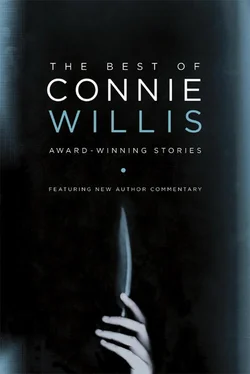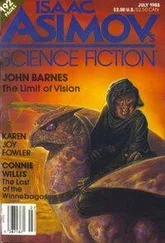I nodded. Calvin raised his baton, and the entire auditorium, except for the Altairi, rose as one and began to sing. And if I’d thought “Adeste Fideles” sounded wonderful, “The Hallelujah Chorus” was absolutely breathtaking, and suddenly all those lyrics about glorious songs of old and anthems sweet and repeating the sounding joy made sense. “And the whole world give back the song,” I thought, “which now the angels sing.”
And apparently the Altairi were as overwhelmed by the music as I was. After the fifth “Hal-leh-eh-lu-jah!” they rose into the air like they’d done before. And rose. And rose, till they floated giddily just below the high domed ceiling.
I knew just how they felt.
It was definitely a communications breakthrough. The Altairi haven’t stopped talking since the All-City Sing, though we’re not actually much farther along than we were before. They’re much better at asking questions than answering them. They did finally tell us where they came from—the star Alsafi in the constellation Draco. But since the meaning of Altair is “the flying one” (and Alsafi means “cooking tripod”), everyone still calls them the Altairi.
They also told us why they’d turned up at Calvin’s apartment and kept following me (“We glimpsed interesting possibilities of accord between you and Mr. Ledbetter”) and explained, more or less, how their spaceship works, which the Air Force has found extremely interesting. But we still don’t know why they came here. Or what they want. The only thing they’ve told us specifically was that they wanted to have Dr. Morthman and Reverend Thresher removed from the commission and to have Dr. Wakamura put in charge. It turns out they like being squirted, at least as much as they like anything we do. They still glare.
So does Aunt Judith. She called me the day after the All-City Sing to tell me she’d seen me on CNN and thought I’d done a nice job saving the planet, but what on earth was I wearing? Didn’t I know one was supposed to dress up for a concert? I told her everything that had happened was all thanks to her, and she glared at me (I could feel it, even over the phone) and hung up.
But she must not be too mad. When she heard I was engaged, she called my sister Tracy and told her she expected to be invited to the wedding shower. My mother is cleaning like mad.
I wonder if the Altairi will give us a fish slice. Or a birthday card with a dollar in it. Or faster-than-light travel.
Afterword for “All Seated on the Ground”

When I wrote this story, I relied heavily on my thirty-odd years of experience singing in church choirs, during which I sang every Christmas carol ever written and learned way more than I ever wanted to know about them. And about everything else.
As I have often said, everything you need to know about the world can be learned by singing in a church choir. Comedy, drama, intrigue, romance, revenge, pride, lust, envy, greed, vainglory… You name it, church choirs have it all. Plus, you find out a bunch of other useful stuff to get you through life. Like:
1. If the person singing next to you is flat, it’s fairly easy to stay on pitch. If they’re sharp, you’re doomed.
2. The third verse of any hymn (or the fifth if it has six verses) is where they stick the really terrible lyrics, which is why so many ministers opt for “verses 1, 2, and 4.” Verse 3 is where you’ll find gems like “sorrowing, sighing, bleeding, dying” and “O mysterious condescending! O abandonment sublime!”
3. On the other hand, at least hymns with bad lyrics are interesting , unlike most of modern praise music, which is boring beyond belief. I’ll take “Nor thorns infest the ground” over “Oh, God, you’re so awesome” any day.
4. Divinely inspired is not the same as good. Many beloved hymns and Christmas carols are actually hideous, which you would know if you had to sing them every year.
I particularly loathe “O Little Town of Bethlehem.” During one of those Christmas Eve services where they tell the carol’s history and then the choir sings it (the carol, not the history), the minister described in detail the circumstances under which “O Little Town” had been written.
The author, the minister said, an Episcopal priest named Phillips Brooks, had visited the Holy Land, ridden to Bethlehem on horseback, and, once there, sat through a five-hour church service, and had been so inspired by the whole experience that he’d immediately sat down (really? I find the entire story somewhat questionable) and written the carol.
After which account, my daughter (also in the choir and sitting next to me) leaned over and whispered to me, “Oh, well, I guess it’s the thought that counts, Mom,” followed by sputters of suppressed laughter and our not being allowed to sit together anymore.
THE LAST OF THE WINNEBAGOS

On the way out to Tempe I saw a dead jackal in the road. I was in the far left lane of Van Buren, ten lanes away from it, and its long legs were facing away from me, the squarish muzzle flat against the pavement so it looked narrower than it really was, and for a minute I thought it was a dog.
I had not seen an animal in the road like that for fifteen years. They can’t get onto the divideds, of course, and most of the multiways are fenced. And people are more careful of their animals.
The jackal was probably somebody’s pet. This part of Phoenix was mostly residential, and after all this time people still think they can turn the nasty, carrion-loving creatures into pets. Which was no reason to have hit it and, worse, left it there. It’s a felony to strike an animal and another one to not report it, but whoever had hit it was long gone.
I pulled the Hitori over onto the center shoulder and sat there awhile, staring at the empty multiway. I wondered who had hit it and whether they had stopped to see if it was dead.
Katie had stopped. She had hit the brakes so hard she sent her car into a skid that brought it up against the ditch, and jumped out of the jeep. I was still running toward him, floundering in the snow. We made it to him almost at the same time. I knelt beside him, the camera dangling from my neck, its broken case hanging half-open.
“I hit him,” Katie had said. “I hit him with the jeep.”
I looked in the rearview mirror. I couldn’t even see over the pile of camera equipment in the backseat with the eisenstadt balanced on top. I got out. I had come nearly a mile, and looking back, I couldn’t see the jackal, though I knew now that that was what it was.
“McCombe! David! Are you there yet?” Ramirez’s voice said from inside the car.
I leaned in. “No,” I shouted in the general direction of the phone’s receiver. “I’m still on the multiway.”
“Mother of God, what’s taking you so long? The governor’s conference is at twelve, and I want you to go out to Scottsdale and do a layout on the closing of Taliesin West. The appointment’s for ten. Listen, McCombe, I got the poop on the Amblers for you. They bill themselves as ‘One-Hundred Percent Authentic,’ but they’re not. Their RV isn’t really a Winnebago, it’s an Open Road.
“It is the last RV on the road, though, according to Highway Patrol. A man named Eldridge was touring with one, also not a Winnebago, a Shasta, until March, but he lost his license in Oklahoma for using a tanker lane, so this is it. Recreation vehicles are banned in all but four states. Texas has legislation in committee, and Utah has a full-divided bill coming up next month. Arizona will be next, so take lots of pictures, Danny Boy. This may be your last chance. And get some of the zoo.”
Читать дальше













